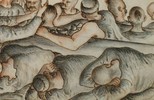Benedetta Chizzolini: Medical Vigilance and Social Deviance: the medical examination of galley slaves in Mediterranean Italy (16th-17th century)
Vortrag im Rahmen des Oberseminars Frühe Neuzeit
14.02.2022
 In early modern Europe, a 'culture of vigilance' was reflected, perfected and finally lived as an integral part of medical theory and practice. Since ancient times, the doctor had been required to be 'vigilant', in particular with regard to the signs and symptoms of illness manifested and/or complained by the patient, with the ultimate objective of implementing successful medical treatment. Indeed, although it is true that the doctor's primary mission was to ensure the health and recovery of the patient, his loyalty to the patient was explicitly relegated to the second place when the latter performed an action that was regarded as detrimental to the interests of the society, and was therefore perceived as a 'dangerous individual'. In this sense, the "marginal" character of galley slaves makes those figures an exceptional case study. The fact that they were considered as an intrinsically dangerous category led the physicians – as well as the whole society - to treat them immediately with a suspicious and scrupulous attitude, which turned into real 'vigilance' when they were accused of having committed actions considered seriously dangerous and in opposition to the values of society. In this sense, the accusation of simulating diseases and sodomy offer the possibility to investigate the attitudes towards two crimes considered to be seriously dangerous, as against nature, and which require scrupulous examination by the physician.
In early modern Europe, a 'culture of vigilance' was reflected, perfected and finally lived as an integral part of medical theory and practice. Since ancient times, the doctor had been required to be 'vigilant', in particular with regard to the signs and symptoms of illness manifested and/or complained by the patient, with the ultimate objective of implementing successful medical treatment. Indeed, although it is true that the doctor's primary mission was to ensure the health and recovery of the patient, his loyalty to the patient was explicitly relegated to the second place when the latter performed an action that was regarded as detrimental to the interests of the society, and was therefore perceived as a 'dangerous individual'. In this sense, the "marginal" character of galley slaves makes those figures an exceptional case study. The fact that they were considered as an intrinsically dangerous category led the physicians – as well as the whole society - to treat them immediately with a suspicious and scrupulous attitude, which turned into real 'vigilance' when they were accused of having committed actions considered seriously dangerous and in opposition to the values of society. In this sense, the accusation of simulating diseases and sodomy offer the possibility to investigate the attitudes towards two crimes considered to be seriously dangerous, as against nature, and which require scrupulous examination by the physician.
- Zeit: 17-19 Uhr c.t.
- Ort: Amalienstr. 52, Raum K 402

